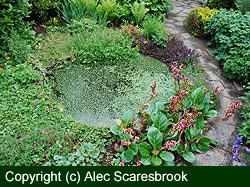Post from Val:
This year the growth of common duck weed (Lemna minor) in our pond has exploded. In other years, it has just grown at a steady rate, but this year it’s exceptional, covering the pond in just a day or two. I think it must be due to the recent warm weather and the increasing light levels.

We discovered a long time ago that you can't beat duckweed and to just go with it. It doesn't matter what you try to get rid of it – it always comes back. Even after we re-lined the pond (the liner was leaking) and re-filled it, the duckweed was back in a few months. Where does it come from? Presumably some blows in, but mostly it comes from birds that do the rounds of local water supplies for bathing and drinking. One of the reasons we put a pond in our garden was for the wildlife, to help it survive and provide us with entertainment too.
We created an easily accessible place for birds and other creatures to visit by making a shelf on one side and piling up some pebbles. Every day a bathing party turns up for a dip - if it's not the blackbird with its groupie sparrows in tow, it's the starlings hustling and barging in. But it's the starlings that provide the most entertainment - they splash about like noisy kids – so we call them ‘the boys’.
So, what do we do about the duckweed? Well, it’s not a problem to wildlife, and the weed provides useful shade and takes up nutrients so we don’t have blanket weed problems. But we put in water crowfoot (Ranunculus peltatus) to do this – it’s less of a thug and has pretty white flowers too in spring. The duckweed problem is that it blocks the view of the newts and frogs, and eventually makes the pond look like a bright green lawn. A local cat got a shock when it thought the green surface was solid – never seen a cat move so fast, just like in the cartoons with legs spinning in the air.
So we just skim the duckweed off with a net or a sieve, returning any newts and snails that we accidentally scoop up in the process, and restoring the reflective surface, which is what makes a pond so attractive.
And that’s it. Apart from skimming duckweed in spring and summer, and fallen leaves in autumn, our pond looks after itself.
See: www.gardenmasterclass.co.uk
 or for your mobile
or for your mobile
